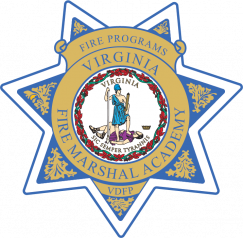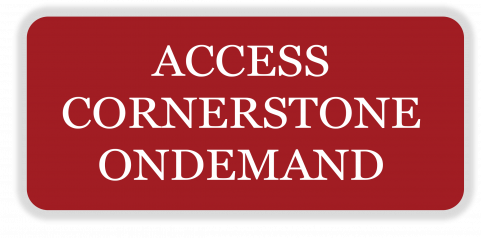The Governor’s Fire Service Awards were established in 2002 as a formal recognition of excellence in Virginia’s Fire Services. The awards are presented annually to recipients in eight categories. Each award has its own criteria. Nominations are accepted in each category, which are then reviewed, scored and selected for recommendation by the Executive Committee of the Virginia Fire Services Board. The recommendations are forwarded to the Governor through the Secretary of Public Safety and Homeland Security for final approval. The awards are then presented each February at the annual Virginia Fire Chiefs Association Expo and Symposium. This allows awards to be presented formally before the recipient’s peers. NOMINATION INFORMATION Everyone is encouraged to submit nominations for the Governor’s Fire Service Awards program. Nominations must be completed utilizing the following nomination form by December 31, 2021. The person making the nomination should have knowledge of the nominee’s qualifications and should carefully select the category that most appropriately matches the nominee’s qualifications. Questions should be directed to (804) 371-0220. CATEGORIES AND CRITERIA FOR AWARDS GOVERNOR’S AWARD FOR EXCELLENCE IN VIRGINIA FIRE SERVICES CRITERIA: An individual or organization that exemplifies an outstanding dedication to helping protect the citizens of Virginia against the devastating effects of fire, not only in their own jurisdictions, but in other areas of the Commonwealth. Individual/organization that demonstrate exceptional dedication to sound management principles and excellence in fire service leadership in their department and within Virginia. ELIGIBILITY: Any individual or organization belonging to a recognized municipal, state or DOD Fire Department, or assigned to a suppression force or team working directly for the Commonwealth of Virginia or the United States Federal Government working within the Commonwealth of Virginia. GOVERNOR’S AWARD FOR EXCELLENCE IN VIRGINIA COMMUNITY RISK REDUCTION CRITERIA: An individual or organization that exemplifies outstanding dedication and service for the furtherance of Virginia Public Fire & Life Safety Education not only in their own department, but in other areas of the Commonwealth as well. An individual or organization that exhibits exceptional commitment to the field of fire prevention; to include the adoption, amendment or interpretation of the Statewide Fire Prevention Code, Statewide Building Code, other related codes or fire prevention principles that would impact not only their own jurisdiction but other localities as well. ELIGIBILITY: Any individual or organization belonging to a recognized municipal, state or DOD Fire Department, or assigned to a suppression force or team working directly for the Commonwealth of Virginia or for the United States Federal Government working within the Commonwealth of Virginia, and are engaged in Virginia Public Fire & Life Safety Education. GOVERNOR’S AWARD FOR EXCELLENCE IN VIRGINIA’S FIRE SERVICE TRAINING CRITERIA: Any individual or organization providing lesson plans, support or delivery of programs within the Commonwealth which are fire service related. ELIGIBILITY: Any instructor belonging to a recognized municipal, state or DOD Fire Department, or assigned to a suppression force or team working directly for the Commonwealth of Virginia or for the United States Federal Government, or organization working within the Commonwealth of Virginia. GOVERNOR’S AWARD FOR OUTSTANDING FIRE DEPARTMENT RESPONSE CRITERIA: Any outstanding Fire Department Response made in the last year, that demonstrates mutual aid, integration of multiple system components, interagency interfacing and cooperation, or complex assessment or rescue. The nomination must include a copy of the VFIRS report. ELIGIBILITY: Any fire service organization. GOVERNOR’S AWARD FOR PRIVATE SECTOR EXCELLENCE IN VIRGINIA FIRE SERVICE SUPPORT CRITERIA: Any private sector or nonprofit entity that has demonstrated exceptional dedication to the success of Virginia Fire Services throughout the Commonwealth of Virginia. ELIGIBILITY: Any private sector or nonprofit organization. GOVERNOR’S CIVILIAN EXCELLENCE IN VIRGINIA FIRE SERVICE SUPPORT CRITERIA: Any civilian or organization, with no fire service affiliation or are administrative professionals, fire corps volunteers and other policy makers who exemplify an outstanding dedication to helping protect the citizens of Virginia against the devastating effects of fire. ELIGIBILITY: Any citizen or organization, with no fire service affiliation, or administrative professionals, fire corps volunteers and other policy makers within the Commonwealth of Virginia GOVERNOR’S VIRGINIA FIREFIGHTER OF THE YEAR CRITERIA: Any paid or volunteer firefighter that exhibits outstanding work within his/her own department to enhance fire safety for the citizens they serve. ELIGIBILITY: Any paid or volunteer firefighter within the Commonwealth of Virginia. GOVERNOR’S VIRGINIA FIRE CHIEF OF THE YEAR CRITERIA: Any paid or volunteer fire chief that exhibits leadership, innovation, professional development, integrity, along with superior service to the public and a high level of contributions to the fire service as a whole. ELIGIBILITY: Any paid or volunteer fire chief within the Commonwealth of Virginia.
Search Results for:
2021 Governor’s Fire Service Awards Nominations Open Through December 31, 2021
2021 Governor’s Fire Service Awards Nominations Now Open
Nominations accepted until December 31, 2021
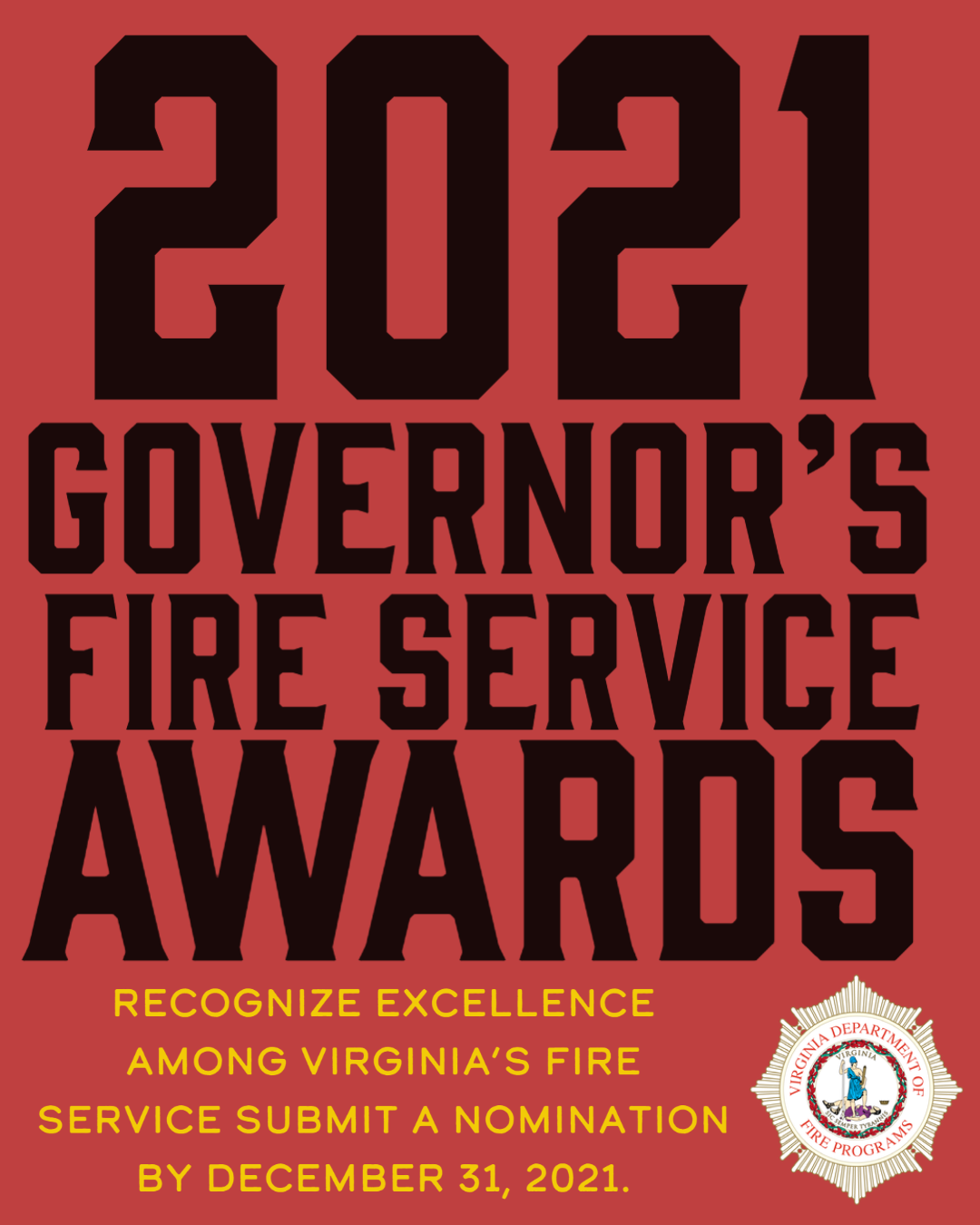
RICHMOND – November 3, 2021 – The Virginia Department of Fire Programs, a leader in enhancing public safety, in conjunction with the Virginia Fire Services Board, are seeking nominations for the 2021 Governor’s Fire Service Awards, which honors and recognizes excellence in Fire Services in the Commonwealth.
The annual Governor’s Fire Service Awards is presented in eight categories during the Virginia Fire Rescue Conference held in February at the Virginia Beach Convention Center.
Nominations can be submitted through an online form on the VDFP website through December 31, 2021.
About the Governor’s Fire Service Awards
The Governor’s Fire Service Awards were established in 2002. In partnership with the Virginia Fire Services Board, the VDFP facilitates the awards.  The Virginia Secretary of Public Safety and Homeland Security presents the Governor with award recommendations, at which the final recipients are then selected. Award categories:
The Virginia Secretary of Public Safety and Homeland Security presents the Governor with award recommendations, at which the final recipients are then selected. Award categories:
- Governor’s Award for Excellence in Virginia Fire Service
- Governor’s Award for Excellence in Virginia Community Risk Reduction
- Governor’s Award for Excellence in Virginia’s Fire Service Training
- Governor’s Award for Outstanding Fire Department Response
- Governor’s Award for Private Sector Excellence in Virginia Fire Service Support
- Governor’s Civilian Excellence in Virginia Fire Service Support
- Governor’s Virginia Firefighter of the Year
- Governor’s Virginia Fire Chief of the Year
Among the 2020 recipients were Virginia Beach Fire Department and the City of Staunton Fire and Rescue, who were recognized for Excellence in Virginia Fire Service Trainingand Outstanding Fire Department Response, respectively. Read more about the 2020 Governor’s Fire Service awards recipients
About the Virginia Department of Fire Programs The Virginia Department of Fire Programs provides training, support services, and resources to more than 700 fire and emergency service organizations, and approximately 44,000 fire service personnel in the Commonwealth. Support areas include funding, professional development, research, operational support, technical assistance, and fire prevention inspections through its State Fire Marshal’s Office.
The Virginia Department of Fire Programs provides training, support services, and resources to more than 700 fire and emergency service organizations, and approximately 44,000 fire service personnel in the Commonwealth. Support areas include funding, professional development, research, operational support, technical assistance, and fire prevention inspections through its State Fire Marshal’s Office.
Virginia Fire Marshal Academy – About
VDFP Regional Schools
VDFP Regional Schools
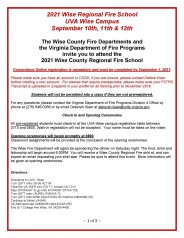 Wise Regional School – September 10-12, 2021
Wise Regional School – September 10-12, 2021
UVA Wise Campus
Register by September 1!
- Courses included:
- Basic Pump Operations
- Hazmat Operations
- Instructor I
- FF1 & FF2 Train-the-Trainer
- Surface Water I & II
- Intro to Tech Rescue – Module II
- Vehicle Operations I
VDFP’s Aid to Localities Funding Increases to $34 Million for Firefighter Training and PPE in the Commonwealth
VDFP’s Aid to Localities Funding Increases to $34 Million for
Firefighter Training and PPE in the Commonwealth
The Aid to Localities funding program increased by 5.45% for Fiscal Year 2022,
stemming from the Virginia Fire Services Board’s approval and fire-related insurance collections.
RICHMOND – July 12, 2021 – The Virginia Fire Services Board (VFSB), a Governor-appointed policy body that consists of 15 members from Virginia’s Fire Service, the insurance industry, municipal organizations, and citizen representatives; and the Virginia Department of Fire Programs (VDFP) announced today a 5.45% budget increase in the Fire Programs Fund. The increase totals $1.8 million dollars to the Virginia Aid to Localities (ATL) funding program, which bumps up the total aid to $34 million dollars for statewide distribution.
ATL funding comes from the Virginia Fire Programs Fund, which is derived from 1 percent of fire-related insurance coverage collected in the previous calendar year. Approximately 75% of the total fund goes directly to a total of 323 counties, cities, and incorporated towns within the Commonwealth. Twenty-five percent goes to VDFP’s operational budget.
VDFP administers the ATL program in conjunction with the Board.
The current fiscal year (FY22) increases follow pivotal milestones for the Board. In 2020, VFSB pushed to increase ATL funding to support training initiatives, construction of fire training centers, firefighting equipment, and protective gear. The Board’s request was made in response to increasing budget trends in Virginia’s Fire Service. During fiscal year 2021 (FY21), minimum ATL funding levels jumped from $10,000 to $15,000 and $20,000 to $30,000. This fiscal year, 152 Virginia localities will see an increase as they received above the minimum in FY21. The Board approved to allow the minimum funding levels to remain at the FY21 increases.
“The Board saw a trend in the rising costs of insurance, particularly the types of insurance in which the 1% that goes to the Fire Programs Fund is derived – fire, miscellaneous property and casualty, marine, homeowners, and farm owners insurance,” said VFSB Chair Scott Garber. “We made a strategic move in considering these increases to align with the rising costs in keeping fire departments operable.”
“The increased funding allows us to assist Virginia’s Fire Service in growing their departments and personnel. In some cases, ATL funding increases budgetary choices for financially strapped fire departments,” said VDFP Acting Executive Director Garrett Dyer. “Our purpose is to assist where we can to help fire departments meet or exceed their service delivery goals.”
Funding is available annually on July 1, the start of VDFP’s new fiscal year. Qualifying localities are required to submit annual reports and financial documentation to receive an allocation.
VDFP State Fire Marshal’s Office Stresses Safety Amid Openings During the Fourth of July Holiday
VDFP State Fire Marshal’s Office Stresses Safety Amid Openings
During the Fourth of July Holiday
RICHMOND – June 30, 2021 – The Virginia Department of Fire Programs’ (VDFP) State Fire Marshal’s Office (SFMO) reminds Virginians that this year’s Fourth of July Holiday will be celebrated with increased pre-pandemic behavior—permitted professional firework shows have been reinstated, but at-home celebrations will still be at the forefront.
With worldwide permissible firework shortages due to COVID-19 and shipping issues, it is again highly anticipated that there will be an influx of illegal fireworks usage throughout the Commonwealth.
In general, any firework that explodes, moves on the ground or in the air, or shoots a projectile is illegal.
VDFP’s State Fire Marshal’s Office serves as the fire code enforcement sector of the state government training agency. Almost 100 retail locations were inspected by SFMO in 2020, where nearly one-third of locations were found to be selling non-permissible fireworks. Approximately 12,000 illegal fireworks were confiscated that were either for sale, or in possession. In 2019, SFMO pulled approximately 10,000 non-permissible fireworks.
VDFP Acting Executive Director Garrett Dyer says, “If all residents follow our precautionary measures, there will be less of a chance of a fire related event, injuries, and an overall safer and happier holiday.” Fire and law enforcement officials will be working through the holiday to ensure the proper safety of the Commonwealth’s residents and visitors.
“The number of illegal fireworks has increased since last summer, even with permissible firework shortages,” said Billy Hux, VDFP Assistant State Fire Marshal of Special Operations. “We stress Virginians to leave fireworks to the professionals—they host for the proper use of permissible fireworks, safety factors, and capabilities.”
Only “permissible fireworks,” as defined in the Code of Virginia, can be legally sold, possessed or used within the Commonwealth. A list of permissible fireworks can be viewed on the VDFP website. The fireworks listed in this document have been field tested to compare the items to the performance criteria of the American Fireworks Standards Laboratory (AFSL). Permissible fireworks may also be further limited in different localities. Check local ordinances as well as the Statewide Fire Prevention Code prior to purchasing and utilizing fireworks.
In order to ensure the proper disposal of used fireworks, residents can call local police or SFMO. VDFP Assistant State Fire Marshal of Special Operations Hux added, “When celebrations come to an end, be sure to dispose of your used fireworks properly, soak spent fireworks in water before placing them in the trash to further prevent a fire-related incident.”
The sale, possession and /or use of any fireworks not classified as permissible is prohibited. Violations can be prosecuted as a Class I Misdemeanor, punishable by a fine not to exceed $2,500 and/or up to one (1) year in jail. Any illegal fireworks can be confiscated by authorities. Many localities prohibit the sale, possession or use of all fireworks.
If you decide to use permissible fireworks, please follow these important safety procedures:
- Check local ordinances on the use of fireworks.
- Fireworks can only be used on private property with the consent of the owner.
- Never use fireworks indoors.
- Never use fireworks while under the influence of alcohol or drugs.
- Never allow children to use fireworks.
- Ensure adequate clearance from people, buildings and combustible material.
- Have a garden hose or other water source readily available in case of fire.
- Soak spent fireworks in water before placing them in the trash.
- Always follow the manufacturer’s instructions.
- Never hold the fireworks in your hands while lighting them.
- Never point fireworks at a person.
If you wish to report illegal fireworks, contact your local police department or contact the State Fire Marshal’s Office at (540) 270-6617.
VDFP Advises Virginians on Motor Fuel Dispensing and Storage Safety amid the Colonial Pipeline Cyberattack
VDFP Advises Virginians on Motor Fuel Dispensing and Storage Safety amid
the Colonial Pipeline Cyberattack
RICHMOND – May 12, 2021 – With the Colonial Pipeline cyberattack causing gas shortages in parts of the East Coast and in the Commonwealth, there have been reports of long lines at gas stations and Virginians traveling to remote locations to find gas reserves in order to stock up.
The Virginia Department of Fire Programs wants to advise residents and commuters about safe ways to dispense flammable fuels such as (gas, diesel or heating oil) into a portable container for proper storage:
- Flammable fuels should not be dispensed into portable containers over 6 gallons, and the containers should be listed and approved for the flammable liquid intended for the portable container.
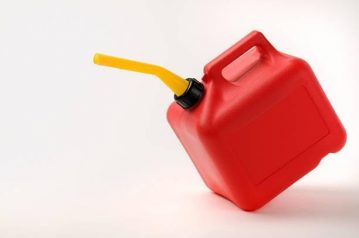
- Portable containers should have a tight closure with a screwed or spring-loaded cover to prevent spills and vapors from escaping.
- When transporting gasoline in a portable container make sure it is secured against tipping and sliding, and never leave it in direct sunlight or in the trunk of a car.
- Flammable fuel should never be dispensed into portable cargo tanks or any other container not listed for flammable liquids.
- Never fill a container while located in the trunk, passenger area of a car or in the bed of a pickup truck.
- All containers should be placed on the ground and clear of any possible ignition sources such as the exhaust from a vehicle.
- Fill portable containers slowly to decrease the chance of static electricity buildup and minimize spilling or splattering. Keep the nozzle in contact with the rim of the container opening while refueling. Fill container no more than 95 percent full to allow for expansion.
- If gasoline spills on the container, make sure that it has evaporated before you place the container in your vehicle. Report spills to the station attendant.
- Never smoke around flammable fuels.
For additional reference, the Virginia Statewide Fire Prevention Code outlines the specific requirements for fuel dispensing and storage:
- 2304.4 Dispensing Into Portable Containers
- 2304.4.1 Approved Containers Required
- 2304.4.2 Nozzle Operation
- 2304.4.3 Location of Containers Being Filled
Contact your local fire marshal or VDFP’s State Fire Marshal’s Office for further information regarding fire and life safety education.
COVID-19 Vaccine Registration
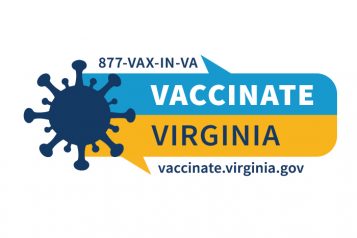
Need a vaccine? Learn how to get your shot at Vaccinate.Virginia.gov or call 1-877-VAX-IN VA. Language translation and TTY services available.
¿Necesita vacunarse? Infórmese de cómo obtener su vacuna visitando Vaccinate.Virginia.gov o llamando 1-877-829-4682. Servicios de traducción y teléfonos de texto (TTY) están disponibles.
VFSB Meeting Dates 2021
VDFP Cautions against the Mishandling of Dry Ice Used for Shipping and Storing COVID-19 Vaccines
VDFP Cautions against the Mishandling of Dry Ice Used for Shipping and Storing COVID-19 Vaccines
Improper handling of dry ice when converted to a gaseous state presents structural, respiratory, and environmental hazards.
RICHMOND – December 30, 2020 – The Virginia Department of Fire Programs, a leader in enhancing public safety, is cautioning first responders, health care professionals, and citizens in the Commonwealth about the dangers of improper storage and disposal of dry ice, which has surged in use to transport COVID-19 vaccines that require storage at ultra-low temperatures.
Dry ice is a solid form of carbon dioxide (CO2). Dry ice weighs just about twice as much as regular ice. Dry ice goes from a solid to a gas (sublimates) as it warms, releasing carbon dioxide.
According to a white paper on dry ice response issued by the International Association of Fire Chiefs (IAFC) Hazardous Materials Committee, the primary health hazard occurs when dry ice returns to its gaseous carbon dioxide state at -78°C. The gas quickly expands and displaces oxygen inside enclosed spaces such as in transport compartments, small buildings, and walk-in coolers.
“We’re noticing a number of groups who are coming into contact with dry ice with the mass distribution of COVID-19 vaccines, who may not be aware of the risks that dry ice may impose. For example, dry ice at room temperature, could “off-gas” a high level of CO2 in a confined space. This is a hazard,” said VDFP Executive Director Michael Reilly. “First responders who are trained in hazardous materials response are aware of the proper handling, storage, and disposal of dry ice. We remain partners in response and prevention. We also want to stress the importance of risk mitigation during such an unprecedented time.”
Additional Hazards
If carbon dioxide gas is released while in transport or in storage, hazards can include an increased potential for an explosion due to pressure building within tightly sealed containers with no pressure relief device, unconsciousness due to displaced oxygen, and frostbite or burns if contact with cryogenic liquid or solid pieces of dry ice occurs.
VDFP encourages groups such as health care professionals and medical facility employees who are administering COVID-19 vaccines to call on first responders when carbon dioxide exposures arise.
“Our concern is about how Virginians should properly interact with the volumes of dry ice that the vaccines are packed with. There should be no eating, drinking, or smoking wherever the dry ice is handled, stored, and disposed,” said Virginia State Fire Marshal Garrett Dyer, “If an accident involving carbon dioxide occurs, such as a spillage, there are also environmental impacts to consider. This is why proper disposal of volumes of dry ice by a trained professional is important.”
How to Safety Interact with Dry Ice
- Protect Your Skin – Contact with unprotected skin will cause severe thermal injury equivalent to full thickness burns. Tight fitting cryogenic gloves are required when handling dry ice and offers the most protection. Where the skin is injured due to exposure to dry ice, the contact area will need to be warmed to avoid tearing off skin.
- Store in a well ventilated area – Most health hazards occur during the sublimation process, when dry ice is warmed and converts from a solid directly to a gas. Dry ice will sublime (melt) at -78°C and begin “off-gassing” which will quickly displace the oxygen inside of confined areas.
Resources
- About carbon dioxide – Airgas
- Dry ice safety – Center for Disease Control (CDC)
- Patient management and hazard response – International Association of Fire Chiefs (IAFC)
